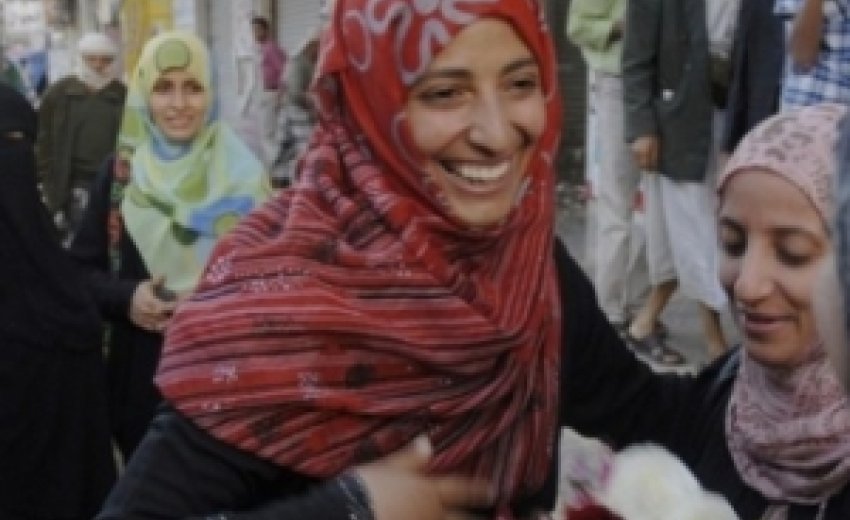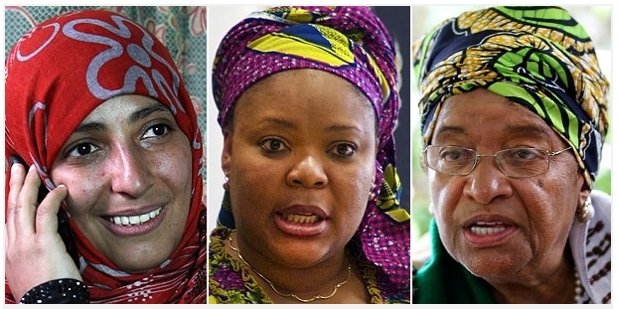Saturday, October 8, 2011: The Nobel Peace Prize for 2011 was awarded Friday to three influential women from Africa and the Middle East, a decision intended to draw attention to the suppression of women’s rights around the world and spur their fight for greater equality in male-dominated societies.
The winners were Liberian President Ellen Johnson Sirleaf, the first elected female president in post-colonial Africa, peace activist Leymah Gbowee, also from Liberia, and Tawakkol Karman, a leading figure in Yemen’s populist revolt this year who inspired thousands of women to rise up in a region where women are considered second-class citizens.
This year’s award arrives as women in Africa and the Middle East find themselves at a crossroads of sorts, trying to break away from a history of restrictions fueled by culture and traditions. While women have become more visible in government and social activism, deep challenges remain in many areas, including education, employment and access to health care.
“We still have a long way to go,” said Nana Asantewa Afadzinu, executive director of the West Africa Civil Society Institute in Accra, Ghana, who has worked with Gbowee. “Women have a challenge in being part of the decision-making process in our countries.”
And although women have played crucial roles in the protests still rocking the Arab world, a conservative backlash in places such as Egypt has prompted efforts in some instances to push them out of the spotlight.
The Oslo-based committee described the award as an important siren call for women the world over. In its citation, read by its head, Thorbjorn Jagland, a former Norwegian prime minister, the committee said that “we cannot achieve democracy and lasting peace in the world unless women obtain the same opportunities as men to influence developments at all levels of society.”
Men have overwhelmingly won the award in its 110-year history; only 12 other women have been honored, including Mother Teresa, American philanthropist Jane Addams and Kenyan environmental activist Wangari Maathai, the 2004 winner, who died last month.
Before Friday’s Nobel committee announcement, online speculation had centered on whether the peace prize would go to leaders of the protests that have toppled long-entrenched rulers in Tunisia, Egypt and Libya. The deadline for nominations was Feb. 1, when protests in Egypt and Libya were still in their early stages.
“I very much appreciate the bloggers,” Jagland said when asked why Karman and not others involved in the protests had received the prize. But Karman’s “courage was long before the world media was there and reporting,” he said.
Karman called the award “a victory for our revolution, for our methods, for our struggle, for all Yemeni youth, and all the youth in the Arab world — in Tunisia, in Egypt, everywhere.”
“This will give the people more strength, and to recognize that peace is the only way, that making a new Yemen must come without violence,” she said, speaking by telephone in broken English from inside her tent in Change Square, the focal point of the uprising in the Yemeni capital, Sanaa.
Wearing her trademark pink floral head scarf and using text messages, Facebook and other social media, Karman was among the first activists to galvanize Yemeni youth when protests against President Ali Abdullah Saleh’s 33-year rule began in January.
A vocal critic of Saleh’s government since 2007, when she ran a human rights group called Women Journalists Without Chains, Karman was detained briefly in January, but protests forced authorities to release her. She has also been attacked by a mob carrying knives and sticks; in recent weeks, she has been unable to move about freely because of concerns that she might be kidnapped.
Her activism is all the more unusual because it is happening in patriarchal, deeply conservative Yemen, where women face restrictions and are often treated violently. Their courtroom testimonies, for example, are worth half those of men. Many young women on Friday said Karman had motivated them to leave their homes and take to the streets.
“The head of every Yemeni woman is raised high in pride,” said Hajar al-Hizyazi, 18, who recently graduated from high school.
Johnson Sirleaf has been involved in Liberian politics for more than 30 years. A Harvard-trained economist, she was briefly the country’s finance minister in 1979. As president, she worked fervently to promote development in Liberia and the rights of women and girls.
“We are now going into our ninth year of peace, and every Liberian has contributed to it,” Johnson Sirleaf told reporters at her home in the Liberian capital, Monrovia, on Friday. “We particularly give this credit to Liberian women, who have consistently led the struggle for peace, even under conditions of neglect.”
The prize announcement dropped right into the last days of an intensely polarized presidential campaign in Liberia. Supporters of Johnson Sirleaf cheered the news, but the opposition condemned it.
Asked by reporters after the announcement whether the Nobel committee was interfering in politics, Jagland said the committee’s decision had nothing to do with the upcoming election or Liberia’s domestic affairs.
Although she persuaded creditors around the world to forgive $4 billion in debts last year and has attracted foreign investment to the country, Liberia remains mired in crippling poverty, with unemployment at around 50 percent.
“Many people are saying that the achievements that she has boasted of outside of the country have not transferred into people's everyday lives,” said Othello Garblah, editor of the New Dawn, a newspaper in Monrovia. “They don’t see it, they don’t feel it. But people have lived for six years and have not heard a gunshot.”
Gbowee, the other Liberian laureate, organized Muslim and Christian women who, wearing white T-shirts, demonstrated together in large numbers. They were instrumental in bringing an end to Liberia’s civil war in 2003. Now living in Ghana, Gbowee heads the Women Peace and Security Network Africa.
“I’m shocked, I’m numb, I’m still really feeling like it’s all a dream to me,” said Gbowee, speaking by telephone from New York, where she is on a book tour. “There is no way we can negotiate peace and security if we leave out the women of the world.”
Campaigners for women’s political rights in West Africa say the role of women in Liberia sparked a continent-wide movement.
“Liberia created a kind of domino effect, where women saw that we can really do something,” said Thelma Ekiyor, who heads the T.Y. Danjuma Foundation, a Nigerian grantmaking organization, and has worked with Gbowee. Women in Ivory Coast and Zimbabwe, inspired in part by what happened in Liberia, have put pressure on their governments, she said.
But Gbowee said many challenges remain in Liberia and around the world, including reproductive rights and rape.
“But there’s acknowledgment now,” she said. “We can only succeed.”
Special correspondent Ali Almujahed in Sanaa and staff writer Debbi Wilgoren in Washington contributed to this report.

